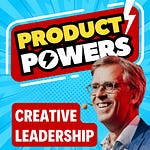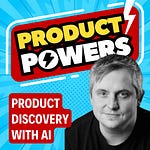I still remember my first manager who had been promoted straight from software engineering. Brilliant coder, terrible people manager. Our one-to-ones had no structure, it felt like a coffee chat without purpose and the “people stuff” always came last. He was a lovely guy, and a talented software engineer, but being great at the job didn’t mean being great at managing people.
That memory came rushing back as I spoke with Laura Ashley-Tims, COO of Notion and co-author of The Answer is a Question. Her journey and the research that underpins her work shines a light on why so many managers are failing to live up to their team expectations. It’s not because they lack the technical skills, but because they lack the superpower of asking better questions.
When Knowledge Isn’t Enough
Laura explained that 82% of managers are “accidental”. They don’t choose the role because they love leading people, they usually fall into it after being promoted for technical excellence. But what follows is often stress, disengaged teams, and the infamous “line manager lottery.” Your experience of work depends less on the company and more on who you report to.
I’m going to share 3 of the biggest insights I took away from our conversation.
Insight #1: Tell Less, Ask More
The core idea behind Laura’s book is deceptively simple, it’s about asking powerful questions. The types of questions that help the other person find clarity, build confidence, and grow capability. Questions that shift the weight of problem-solving back to your team, where it often belongs, not because you're lazy, but because that’s how people develop.
This is what Laura and her team call Operational Coaching®. Unlike traditional executive coaching, Operational Coaching® happens in the flow of work, in real time. And the best part is it doesn’t require hours of training. It starts with a simple model:
STAR®: Stop. Think. Ask. Result.
Stop: Resist the reflex to solve.
Think: Is this a coachable moment?
Ask: Pose questions for their benefit, not yours.
Result: Guide the conversation to a clear next step.
Managers who practice this consistently report getting back almost a day a week because they stop taking on their team’s problems. More importantly, their people grow in confidence and capability.
Insight #2: The Research Proves It Works
Laura’s book is underpinned by a government-backed study with the London School of Economics. Could their inquiry-led coaching style actually drive productivity? It sounded ambitious. Yet across 62 organisations and 14 sectors, the results consistently proved that their questioning approach worked for everyone, from the C-suite to first-line managers.
Here's what the research showed:
Managers who used Operational Coaching® saw higher productivity, stronger collaboration, and lower stress.
Teams became more self-sufficient, leading to fewer escalations and more time for high-value strategic work.
Perhaps most striking yet unexpected outcome was that relationships improved, not just at work, but also at home.
One manager even wrote that using the STAR® approach helped transform his relationship with his neurodivergent son. Another said simply, “Happier wife. Priceless.”
Insight #3: The Human Edge in an AI Age
For decades, knowledge was currency. That’s why experts got promoted. But AI is eroding that advantage. What will set leaders apart in the future is not how much they know, but how well they can unlock the potential of others. Operational Coaching® is not just a technique it will help us future proof our value as managers and leaders.
Final Thoughts
Laura’s journey, from running change programmes to proving her methods in one of the largest studies of its kind, reinforces that leadership is not about having more answers, it’s about creating more thinkers.
The challenge for each of us is to rewrite our own managerial story. Are we still clinging to the belief that our value lies in fixing, directing, and controlling? Or are we willing to experiment with a different story, one where curiosity and better questions become our superpower?
The next time someone comes to you with a problem, try the pause. Resist the urge to take it on. Ask one question that helps them take ownership. Then notice what shifts.
Because in the end, the managers who leave a mark are not the ones who knew the most. They are the ones who helped others grow into their best selves.
Resources
Book
The Answer Is A Question by Laura Ashley Tims and Dominic Ashley TimsFramework
The STAR® model for Operational Coaching®
Stop, Think, Ask, ResultResearch
London School of Economics evaluation of Operational Coaching® and its impact on productivity and retention across multiple sectorsTalks and Ideas Mentioned
Sir Ken Robinson, Do schools kill creativity
George Land, creativity research originally developed for NASA
Guest: Laura Ashley-Timms
Laura Ashley-Timms is recognised as one of the UK’s top Executive Coaches and is the co-creator of the STAR® model (2010) and the multi-award-winning STAR® Manager program (STARmanager.global).
She is an expert and thought leader on how to leverage Operational Coaching™ behaviors across organizations to drive commercial results and improve productivity and engagement levels.
As the co-founder and COO of Notion, a performance improvement consultancy established in 2000, Laura has led the team to win a string of awards for innovation, learning design and academic partnerships and for its work with FTSE and Fortune 500 clients, including Personnel Today magazine's prestigious Learning & Development Supplier of the Year award in 2021.









